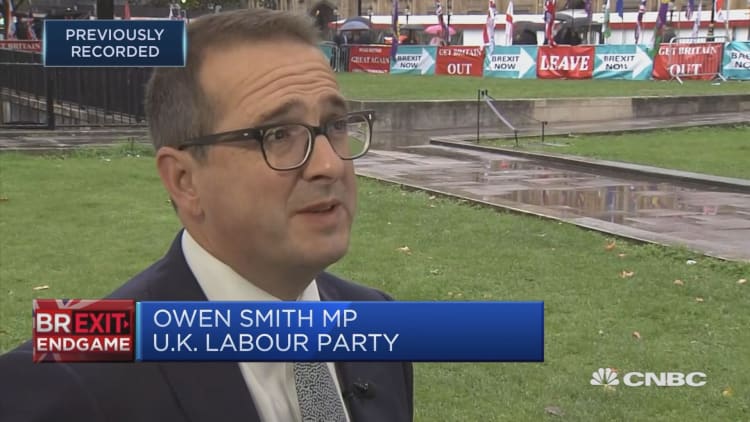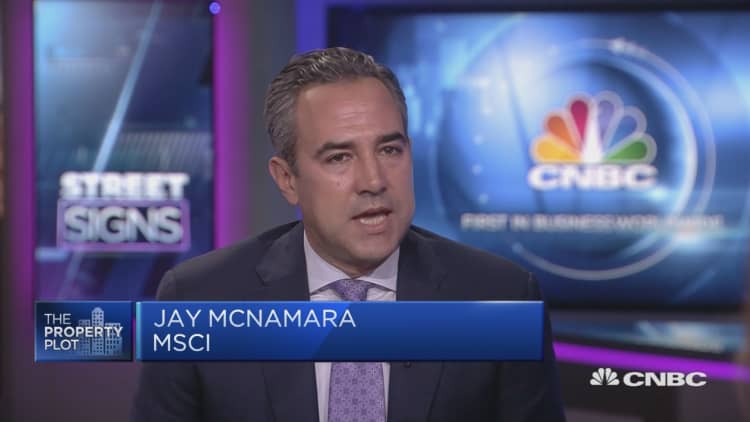British lawmakers remain uncertain about the parliamentary future of a Brexit deal that Prime Minister Boris Johnson is seeking to finalize with fellow European counterparts at a high-pressure Brussels meeting.
If the UK and E.U. negotiators can hammer out a legal text over the next several hours, for approval from the 27 European leaders who will meet on Thursday lunchtime, that settlement would then require ratification in a Westminster legislature that has failed over the past 10 months to agree on almost anything.
"I think there's a chance," opposition Labour Party lawmaker Owen Smith told CNBC Wednesday morning
"The numbers are obviously going to be very, very tight either way, given that the government doesn't have a majority and given that there are very many different interests in this debate."
Johnson's Conservative Party last month expelled almost two dozen members of its parliamentary caucus after they voted against the government in another important Brexit-related vote. Since Johnson took office in July the party has also lost other seats to by-election defeats and defections.
That has meant that a governing majority, which was already slim under his predecessor Theresa May and reliant on support from a clutch of lawmakers from the Northern Irish Democratic Unionist Party (DUP), has now vanished entirely.
After a second consecutive night of face-to-face discussions with the British premier, the DUP issued a statement saying that from their perspective "it would be fair to indicate gaps remain and further work is required" on a deal that could satisfy its lawmakers.

The most intractable issue during Brexit discussions has for almost two years centered around the future status of the border between the Republic of Ireland and the U.K. nation of Northern Ireland. Any change to the current status quo brings with it a variety of implications. It could alter or undermine the integrity of the EU's prized single market, the preservation of peace in a once highly-troubled border region, and the continued unity of a United Kingdom that may become more than just geographically separated by the Irish Sea.
"Everybody knows what our position is in relation to the constitutional and economic integrity of the U.K.," DUP leader Arlene Foster said in an interview with the BBC. "That is where we stand, we continue to stand there."
The opposition Labour Party has been far less consistent in its position on Brexit, but it did unite with other opposition parties the Liberal Democrats and Scottish National Party (SNP) to force through legislation last month intended to avoid a U.K. departure from the EU without some kind of formal exit arrangements.
But that alliance may not hold, as tensions grow more visible between those that would like to see a second referendum, those that would ideally reverse Brexit altogether, and those that are demanding a general election.
"They seem to be one day saying one thing, and another day saying another," said SNP lawmaker Drew Hendry of Labour and the Liberal Democrats.

"This needs to go back to the public in a general election. Westminster can't sort it, it's absolutely broken, there is nothing it can do to get through this impasse."
Johnson has dared opponents to allow him to have an election, but Labour leader Jeremy Corbyn has refused on the grounds that it might permit Johnson to unilaterally exit the European Union under the economically damaging scenario that's now commonly referred to as "no deal."
Johnson has separately and repeatedly said that the U.K. will leave on or before Oct. 31, insisting that he would "rather be dead in a ditch" than ask for a third extension to the Brexit deadline.
But if an extension proves necessary, either because negotiators need more time to fine-tune an international treaty containing hundreds of pages of legal text, or because European leaders are not satisfied with the U.K.'s final offer by Friday, there are members in Johnson's own party who say that the leader should be realistic and allow a little more time.
"This is very different from any of those previous times and we are just about there," said a former U.K. defense minister and Conservative lawmaker Tobias Ellwood, who was at pains to point out that even the D-Day landings in Normandy had been delayed. "If it requires a few extra days just to confirm the details, let's actually go for it."
"In five or 10 years' time people won't look back and say 'we still punish the Conservative Party because they didn't honor that 31st of October deadline.' They will punish us if we end up throwing our teddies in the corner and choosing no deal, and our economy goes where everybody says it will go."


